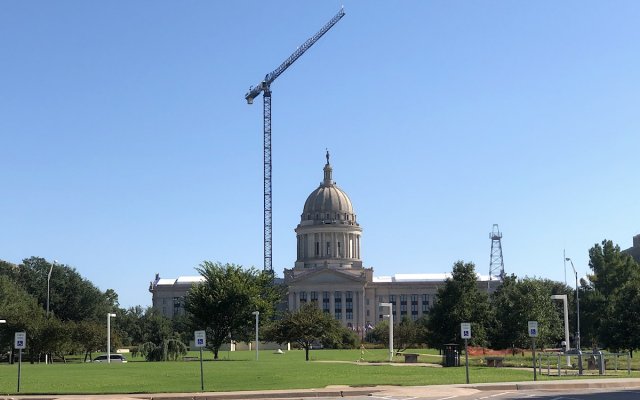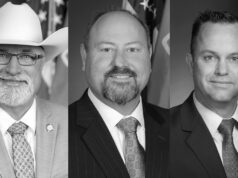Compared to its counterparts in most other states, the Oklahoma Constitution stands as a robust document. Its size, scope and guidelines are considered either over-reaching and cumbersome or populist and protective, depending on which side of an issue one might be. And as governing documents go, it is firm: The Oklahoma Constitution can only be modified through a vote of the people, which can be called for either by the state Legislature or by an initiative petition.
As leaves, temperatures and fantasy football hopes fall at the end of this year, 2020 appears to be ripe with proposed amendments to the Oklahoma Constitution. Three have been officially proposed by advocacy groups outside the Legislature.
Hospital and health care advocates have submitted more than the 178,000 voter signatures required to propose a Medicaid expansion constitutional amendment. A group called People Not Politicians has filed a legislative redistricting ballot initiative, which now faces a legal challenge. And the group Oklahomans for Criminal Justice Reform has also submitted language for a constitutional amendment prohibiting the use of past non-violent felonies to enhance the incarceration sentences for subsequent non-violent felonies.
Three proposed constitutional amendments … so far
Unpacking the full history and political landscape surrounding each of those topics would take more time than is allotted for this piece. In short, however, each group believes the Legislature has no intention of approving its preferred proposal, and ample evidence exists to that end.
Republican state leaders have had nearly a decade to expand health insurance coverage for low-income, working adults as authorized by the Affordable Care Act. Hospital executives, health care advocates and even chambers of commerce spent those years gently tailoring a tepid message that could have allowed Republicans to approve private insurance subsidies instead of straight government-provided coverage. Even with a new governor who promised his own health care plan by the end of this year, nothing has been accomplished. So State Question 802 was filed, and droves of Oklahomans signed the petition.
On Oklahoma’s redistricting process, legislative leaders have long embraced their ability to draw district maps themselves, regardless of which party was in charge. As the 2020 U.S. Census approaches, a grassroots organization skipped what would have been presumably futile attempts to have the Legislature change its own rules. Instead, SQ 804 would constitutionalize a complex and independent board tasked with adjusting legislative and congressional districts after each federal census. With districts due to be redrawn in 2021, debate over SQ 804’s constitutional amendment could split on both Republican / Democrat and rural / urban axises.
Contrary to those proposals, criminal justice reformers’ filed constitutional amendment on sentence enhancement would address an issue that almost reached a final floor vote during last legislative session. Many lawmakers expected reform negotiations on the topic to continue this year, but speculation has also focused on whether the Oklahoma Attorney General Office’s Criminal Justice Reclassification Coordination Council will simultaneously be recommending new sentence enhancement statutes for 2020. Meanwhile, OCJR’s successful SQ 780 and 781 campaigns only changed statute, whereas SQ 805 filed for 2020 would change the constitution. That means about 178,000 signatures will be required for it to qualify for a ballot.
Oklahoma’s kerosene rule as relevant history
While many Oklahomans are frustrated by legislative inaction and view initiative petitions as a way to take governance into their own hands, many Oklahomans also remain skeptical about adding items into the Oklahoma Constitution, which already features 29 active articles.
In 2018, voters narrowly disapproved of SQ 793 concerning the practice of optometry. Many voters directly voiced opposition to placing the topic in the Oklahoma Constitution, and legislative compromise was found months later. In 2016, voters more broadly disapproved of SQ 777, which would have added constitutional language prohibiting types of agriculture regulation.
For decades, some Oklahoma political theorists have argued the state needs a new constitutional convention to pair down its lengthy foundational document. Media, lawmakers and onlookers often point to Article 20, Section 2 as evidence of the Oklahoma Constitution’s overreach.
The 42-word section — which actually includes a rare constitutional caveat allowing legislative adjustment — establishes a legal flashpoint for kerosene:
Until changed by the Legislature, the flash test provided for under the laws of Oklahoma Territory for all kerosene oil for illuminating purposes shall be 115 degrees Fahrenheit; and the specific gravity test for all such oil shall be 40 degrees Baume.
While it’s good fodder for political science classes and bar trivia games, Oklahoma’s constitutional kerosene requirement speaks directly to its political history and to a sense of American populism still rooted in the proverbial genetics of modern Okies.
Around the time Oklahoma’s constitution was being written, a number of towns across the United States had burned to the ground owing to unregulated kerosene. Fearing that some producers were trying to make money by selling lesser lamp fuel to the poor, Oklahomans stuck a proper flashpoint for kerosene into their new constitution. They also employed inspectors to check every railroad car that brought kerosene into the state.
In their constitution, those folks now called Oklahomans trusted neither a strong executive nor the hearts of profit-driven salesmen.
2020 question: What belongs in the Oklahoma Constitution?
Back in the 21st century, just who Oklahomans trust seems less easy to assess. After years of low numbers, voter approval of the Legislature has recently been higher than most might think (44.2 percent favorability compared to 33.8 percent unfavorability in August).
Yet legislative inaction on the topic of Medicaid expansion has led to palpable frustration and a presumptive vote on a constitutional amendment. The other two constitutional proposals described above are not nearly as large on the public radar, but they fall under categories that speak to Oklahoma’s populist roots and modern considerations: election reform and smart on crime.
Should voters have the chance to consider all three proposals on 2020 ballots, the question of what belongs in the Oklahoma Constitution will be key to each debate. Light your lamps and pay attention, voters.






















